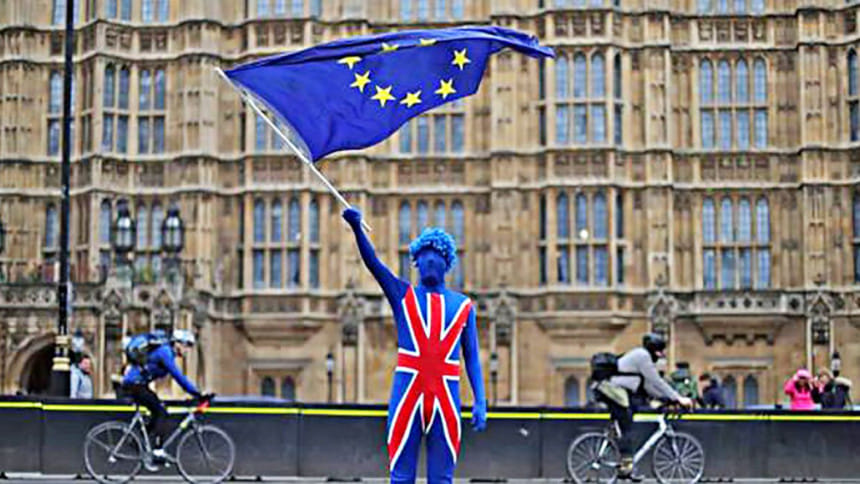Brits in a fix over Brexit

Prime Minister Theresa May recently was on a three-nation tour of Africa. Her first stop was South Africa, the first by a British prime minister since 2011. She then went on to Nigeria and Kenya, becoming the first British PM to visit the East African country in over 30 years. The PM was accompanied by a delegation of 29 business leaders to promote "the breadth and depth of British expertise in technology, infrastructure, and financial and professional services," according to an announcement from Downing Street. The African safari was part of a British drive to reach out to countries with which May plans to rebuild old trade relationships which fell by the wayside during the 45 years of EU membership. "This week I am looking forward to discussing how we can do that alongside Africa to help deliver important investment and jobs as well as continue to work together to maintain stability and security," the PM added.
The initiative to find new trading partners may take the British PM and her emissaries to many other capitals in the coming months as the UK prepares to cut the umbilical cord with the EU. The UK is scheduled to leave the European Union at 11pm UK time on Friday, March 29, 2019. The two sides are currently negotiating the terms of departure, which include the future of citizens in each other's territory and business relations between the two entities. While March 2019 is still more than six months away, there are some important deadlines to meet, since any deal negotiated has to be approved by the EU and UK parliaments. For EU chief negotiator Michel Bernier, the next quarterly EU summit on October 18-19 is a critical milestone, and the treaty must also be approved by the respective parliaments by January 2019. However, as time goes by, it appears that there is a slight possibility that the UK will leave the EU without a deal on trade issues, and this "No Deal Brexit" is seriously being discussed both in London and Brussels.
British citizens and particularly businesses are dreading the thought of No Deal Brexit, and many are found scratching their heads and contemplating a contingency plan. However, according to various polls, most Brits are keeping their fingers crossed in light of the volatility they experienced in recent months. First, two dedicated Brexiteers, Boris Johnson, the Foreign Secretary and David Davis, the Brexit Secretary, resigned in June over disagreements on policy. Subsequently, the Labour Party, with the support of some Tories who favour staying in the EU, called for a new referendum on Brexit. Theresa May has left no doubt that she is strongly opposed to any notion of another vote. However, many in the UK are still in a state of "can't make up my mind" syndrome. And, to make it worse, Dominic Raab, the new Brexit Secretary came out swinging and tried to reassure the citizens that such an outcome is not going to be so bad after all! This happened in the wake of the British government's publication of the first 25 of the 80 planned technical notices designed to help businesses navigate a no-deal Brexit.
Unfortunately, even rumours of a No Deal Brexit are having a dampening effect on the economy. May's own Chancellor of the Exchequer, Philip Hammond, warned against a no deal exit. The government reported at the end of August, that over the past 12 months, GDP growth has been just 1.3 percent. "Inflation picked up slightly in July – to 2.5% – and is likely to remain stuck around this level in the months ahead. That will put a dampener on the growth of consumer spending, even though recent retail sales figures have been encouraging," The Guardian reported on August 28.
Claudia Catelin from the Institute of Directors (IoD), a leading business group, warned that businesses have "a short time" in which to make plans and that planning for a no-deal Brexit is a "logical baseline".
She said that findings had shown that only one-third of IoD members had made plans for a no-deal Brexit, with the majority waiting for further clarity on the terms of the withdrawal agreement in the transitional period. Allie Renison, head of Europe and trade policy at IoD added, "A lot of these companies don't know all the different information they need to put into this."
The uncertainty is aiding a fringe section of British political actors who are in favour of remaining in the EU and are sometimes using scare tactics and pessimistic predictions: a) in case there is No Deal and, b) even with an agreed-upon deal. The Brexiteers disparagingly term the scaremongering as "Project Fear", or fear of destitution. To dispel the Project Fear camp, Brexit Secretary Raab promised that there will be no shortages of bacon, lettuce, and tomato, three essential ingredients for a "BLT sandwich", a British staple. "Let me assure you that, contrary to one of the wilder claims, you will still be able to enjoy a BLT after Brexit," said Raab.
In the face of all the rough seas she is facing—tough EU-UK negotiations, the lack of any agreement, and the looming March exit—the British PM was unfazed during the mission to Africa.
"I've said right from the beginning that no deal is better than a bad deal. I think it's absolutely right that the government is putting the preparations in place for no deal because we don't know what the outcome of this is going to be. But alongside that what we're doing is working for a good deal."
"Look at what the director of the World Trade Organization has said. He said about a no-deal situation that it would not be a walk in the park but it wouldn't be the end of the world."As the world can see, May is no pushover!
Dr Abdullah Shibli is an economist, and Senior Research Fellow, International Sustainable Development Institute (ISDI), a think-tank in Boston, USA. His new book Economic Crosscurrents will be published later this year.










Comments